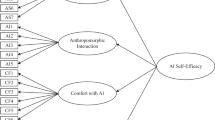Abstract
Changes and interrelations among computer usage, computer attitude, and skill transfer of elderly Japanese computer users were investigated over a one-year period. Each participant, aged 60 to 76 years, was provided with one touchscreen-based computer specialized for e-mail handling for 12 months. Participants’ usage of the computer, mouse and/or keyboard, and computer attitudes were investigated. The results showed that the “Liking” factor of the computer attitude scale was a possible predictor of computer usage. The results suggested the existence of four different types of users’ adaptation to computers, according to a combination of the “Liking” and “Confidence” dimensions of computer attitude.
Similar content being viewed by others
References
Bandalos D, Benson J (1990) Testing the factor structure invariance of a computer attitude scale over two grouping conditions. Educ Psychol Meas 50:49–60
Craik FIM, Salthouse TA (eds) (2000) The Handbook of Aging and Cognition. 2nd edn. Erlbaum, Mahwah
Czaja SJ (1996) Aging and the acquisition of computer skills. In: Rogers WA, Fisk AD, Walker N (eds) Aging and Skilled Performance: Advances in Theory and Applications. Erlbaum, Mahwah, pp 201–220
Czaja SJ (1997) Using technologies to aid the performance of home tasks. In: Fisk AD, Rogers WA (eds) Handbook of Human Factors and the Older Adults. Academic Press, San Diego, pp 311–334
Czaja SJ, Guerrier JH, Nair SN, Laudauer T (1993) Computer communication as an aid to independence for older adults. Behav Inf Technol 12:197–207
Czaja SJ, Lee, CC (2001) The Internet and older adults: design challenges and opportunities. In: Charness N, Parks DC, Sabel BA (eds) Communication, Technology and Aging: Opportunities and Challenges for the Future. Springer, New York, pp 60–80
Czaja SJ, Sharit J (1998) Ability-performance relationship as a function of age and task experience for a data entry task. J Exp Psychol: Appl 4(4):332–351
Czaja SJ, Sharit J (1998) Age differences in attitudes toward computers. J Gerontol: Psychol Sci 53B(5):329–340
Dyck JL, Smither JA (1994) Age differences in computer anxiety: The role of computer experience, gender and education. J Educ Comput Res 10(3):239–248
Ellis RD, Allaire JC (1999) Modeling computer interest in older adults: The role of age, education, computer knowledge, and computer anxiety. Hum Factors 41(3):345–355
Fisk AD (1999) Human factors and the older adult. Ergonomics Design 7(1):8–13
Jamieson BA, Rogers WA (2000) Age-related effects of blocked and random practice schedules on learning a new technology. J Gerontol: Psychol Sci 55B(6):343–353
Jay GM, Willis SL (1992) Influence of direct computer experience on older adults’ attitude toward computers. J Gerontol: Psychol Sci 47:250–257
Karat J, McDonald JE, Anderson M (1986) A comparison of menu selection techniques: Touch panel, mouse and keyboard. Int J Man-Mach Stud 25:73–88
Kelley CL, Morrell RW, Park DC, Mayhorn CB (1999) Predictors of electronic bulletin board system use in older adults. Educ Gerontol 25:19–35
LaLomia MJ, Sidowski JB (1991) Measurement of computer attitudes: A review. Int J Hum-Comput Interact 3(2):171–197
Loyd BH, Gressard C (1984) Reliability and factorial validity of computer attitude scales. Educ Psychol Meas 44:501–505
Loyd BH, Gressard C (1984) The effects of sex, age, and computer experience on computer attitudes. AEDS J 18(2):67–77
Loyd BH, Loyd DE (1985) The reliability and validity of an instrument for the assessment of computer attitudes. Educ Psychol Meas 45:903–908
Mead SE, Sit RA, Rogers WA, Jamieson BA, Rousseau GK (2000) Influences of general computer experience and age on library database search performance. Behav Inf Technol 19(2):107–123
Morrell RW, Park DC, Mayhorn CB, Kelley CL (2000) Effects of age and instructions on teaching older adults to use ELDERCOMM, an electronic bulletin board system. Educ Gerontol 26:221–235
Rogers WA, Fisk AD (2000) Human factors, applied cognition, and aging. In: Craik FIM, Salthouse TA (eds) The Handbook of Aging and Cognition. 2nd edn. Erlbaum, Mahwah, pp 559–591
Rogers WA, Fisk AD, Mead SE, Walker N, Cabrera EF (1996) Training older adults to use automatic teller machines. Hum Factors 38(3):425–433
Roszkowski MJ, Devlin SJ, Snelbecker GE, Aiken RM, Jacobson HG (1988) Validity and temporal stability issues regarding two measures of computer aptitudes and attitudes. Educ Psychol Meas 48: 1029–1035
Sharit J, Czaja SJ (1999) Performance of a computer-based troubleshooting task in the banking industry: Examining the effect of age, task experience, and cognitive abilities. Int J Cogn Ergonomics 3(1):1–22
Smith MW, Sharit J, Czaja, SJ (1999) Aging, motor control, and the performance of computer mouse tasks. Hum Factors 41(3):389–396
Stone WH, Thompson SD, Lacount DM (1989) Attitudes of high school counselors toward computers. School Counselor 36:281–285
Umemuro H (2002) Japanese elderly and computers in the workplace. Gerontechnol 2(1):63–67
Woodrow JJ (1991) A comparison of four computer attitude scales. J Educ Comput Res 7(2):165–187
Author information
Authors and Affiliations
Corresponding author
Rights and permissions
About this article
Cite this article
Umemuro, H., Shirokane, Y. Elderly Japanese computer users: assessing changes in usage, attitude, and skill transfer over a one-year period. UAIS 2, 305–314 (2003). https://doi.org/10.1007/s10209-003-0049-7
Published:
Issue Date:
DOI: https://doi.org/10.1007/s10209-003-0049-7



